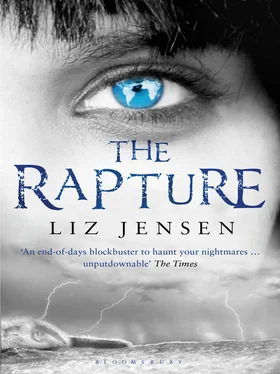I’ve sensed sympathy too often not to recognise it now.
‘Look, before you go any further, I must tell you that this information isn’t new to us, Dr Melville,’ she says gently. She could be talking to one of her grandchildren. ‘We’ve already heard about those predictions. And where they come from. We do recognise it’s quite a coincidence. But no more than that.’ Has Bethany contacted them herself? ‘Several organisations, ours among them, were approached some time ago by a very disturbed woman. She claimed the disasters were being caused by a child in a psychiatric institution where she used to work. Somewhere on the south coast. Hadport, I think.’ There is nothing to say. Karla Fitzgerald looks apologetic. ‘The girl’s name was… Bethany?’ Frazer Melville looks down at his hands. ‘Look. I appreciate your both taking the time to come and see us. A lot of people are very concerned about these issues, and so they should be,’ Karla finishes diplomatically. ‘We always tell them that the best way to help is to make a donation, or become active in the organisation. I have some membership forms here,’ she says, standing again, returning to her desk and reaching in a drawer. She fans out some bright papers. ‘Is that something that might interest either of you?’
Beyond humiliation, we drive home in silence.
Sex is a great healer, but once again the physicist is not interested. He flinches from my touch. I feel spurned, even though I know it means nothing. Might mean nothing. Doesn’t necessarily mean anything. I should go home but I make the mistake of not doing so. Instead—
Anger management theory, which I have only recently been propounding to a roomful of surly psychotic teenagers, has it that one should not allow irritants and grievances and defeats to accumulate. That one cannot read the minds of others, any more than one can make the world accord with one’s own vision of how it should be run. But soon the physicist and I have begun a heated argument in which I fail quite spectacularly to practise what I have spent so much time preaching, both to myself and to others. I insist that we must do something more, something that will make a difference. Still smarting from our defeat, he wants to know what, now that we have burned our bridges. Tell new people, I say. People who will believe. He is scathing about who those people might be.
‘Internet paranoiacs. Eco-fanatics. Psychics. People on the distant margins. The kind of people you give a wide berth to. The kind of people Sheldon-Gray Googled for you. Freaks in Prague and mystics in Yucatan. Apocalypse dot fucking com. Forget it.’
I secretly agree with him but cannot allow pessimism to prevail. We part on bad terms. He has lost what looks like five kilos in two weeks, and doesn’t look well on it. I am supposed to have an understanding of the human psyche. But today I do not.
The next morning when I arrive at work I’m informed at Reception that Dr Sheldon-Gray wants to see me immediately to discuss an ‘incident’ involving Bethany Krall. When I get there I discover that today his pomposity is formal, statesmanlike, as though the next step in his career involves a UN candidature. He is afraid there is bad news. Bethany is in casualty at St Swithin’s hospital. She is ‘not doing too well’.
‘What happened?’
‘Electrocution. She got hold of a metal fork and stuck it in a socket. Passed out, of course. Burns all over her hands and up her arms. Miracle she’s not dead. Rubber soles. Oh, and before all that she shaved her head.’
‘Totally?’
‘It seemed ritualistic. They’re keeping her in hospital.’ Something’s up. I can feel it in the air. He has a plan.
‘So what now?’ I’m wondering how best to play this.
He places his hands on the desk, spreads out his fingers, and eyes me defiantly. ‘I’m having her transferred to Kiddup Manor.’ Kiddup Manor: modern psychiatry’s Death Row.
In the silence that follows he lifts his hands from the desk and places them in an attitude of prayer, the middle fingers touching his lower lip. The blue eyes scroll across my face assessingly. If I speak now, my voice will tremble and I’ll betray myself. So I don’t. Instead I nod, as though Bethany’s transferral to one of the most brutal institutions in the country is worth mature consideration, and will make no difference to me.
‘Any particular reason?’ I manage finally.
‘I’m merely following the guidelines. They’re very clear when it comes to repeated self-harm. Another approach is called for.’
‘You realise what will happen to her there?’ I say as calmly as I can. ‘That all the progress she’s made here in Oxsmith will be undone? That they’ll pump her with drugs until she’s practically a vegetable?’
He shrugs. ‘A safe vegetable. No longer a danger to herself or others. Look, the ECT experiment was a mistake.’
‘It worked.’
‘For a while. But she just stuck a fork in an electric socket, knowing it could kill her. Look, I’m prepared to take responsibility for the ECT decision, I’m the one who signed the forms, and it seemed like the right treatment at the time. It produced an improvement. But now it’s backfired and I admit defeat. Anyway. Since you’ve been her most recent therapist, I just thought you should know. As soon as she’s free to leave hospital, she’s no longer our patient.’
‘Or our problem.’
He smiles tightly. ‘Semantics. There’s no dishonour in admitting that Bethany Krall’s treatment here has been one of our most spectacular failures.’
‘How long will they keep her in St Swithin’s?’
‘Until the burns heal. Take tomorrow off. You look dreadful.’
It’s late. I hesitate, then call the physicist. His phone is busy, so I decide to drive over and tell him what’s happened, hoping that I’ll end up staying the night, and that the tension engendered by our disastrous trip to London will dissolve with a session in bed. What I need is sex. With Frazer Melville. To be in his arms.
A jogger thunders up the pavement outside Frazer Melville’s house, accompanied by three high-stepping dogs on long leashes. There’s no space free directly in front, so I park opposite. The lights are on in his living-room. I’m just about to dial his number so that he can help me negotiate the steps when I glance at the house again. I don’t know why. But that’s when I see her. She’s tall, and wearing jeans, and standing at his window, looking out. Blonde. Trim. Young. She wasn’t there when I pulled up. But now, like a horrible jack-in-the-box, she has materialised in the physicist’s home. Then I see him emerging from the kitchen. Is that where she has come from, too? Has he cooked for her? Like a car driven by a reckless drunk, my heart attempts a sickening U-turn. Fails. And stalls.
The woman looks at home.
She moves away from the window and over to the sofa, where the physicist settles next to her, close enough for their bodies to touch. They’re looking at something together, heads lowered over the table. He wants to impress her. And she’s considering the matter. She has the power.
By now I’m not just trembling. I am shuddering all over. And I can’t seem to stop.
His ex, I realise. Melina. Since the e-mail, she’s been worried about him. So she’s flown over. To take care of him. She doesn’t look Greek. Has she stopped being a lesbian? Does she want him back? Does he want her?
Or not Melina. Someone else. A young colleague. One of his students.
Have they fucked yet?
She crosses her legs and I feel a flash of venomous, untamed envy. She can stand on them, she can run with them, she can use them to get up and down, she can spread them when he’s entering her. A dry retch hatches in my throat.
Читать дальше












